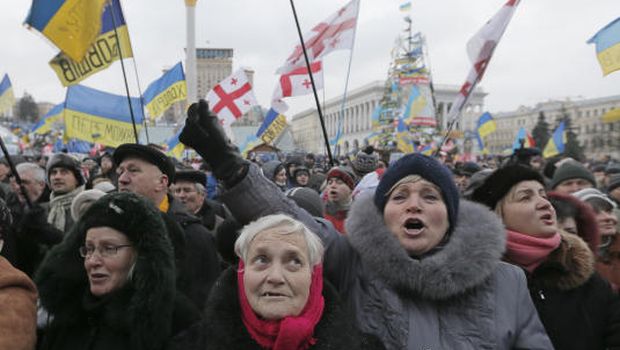
Pro-European Union activists shout slogans during a rally in the Independence Square in Kiev, Ukraine, on Saturday, December 7, 2013. (AP Photo/Efrem Lukatsky)
Kiev, Reuters—Pro-Europe protesters accused Ukrainian President Viktor Yanukovich on Saturday of planning to seal a customs union with former Soviet master Moscow this month, a move that would stoke further turmoil in Kiev.
One opposition leader said returning to Moscow’s economic fold could even endanger the unity of Ukraine, a sprawling country of 46 million that borders four European Union member states and is the main transit route for Russian gas to Europe.
The Moscow and Kiev governments both denied Yanukovich and Russia’s President Vladimir Putin had discussed the customs union in unannounced talks on Friday in the Russian Black Sea resort of Sochi.
But the secrecy of the meeting, and speculation they had struck a deal, was seized on by opposition leaders rallying protesters against a decision last month by Yanukovich to spurn a deal on trade ties and integration with the European Union.
“Any signature to a deal on forming a new Soviet Union means the breakup of the country,” Arseny Yatsenyuk, one of three main opposition leaders, told reporters.
Yatsenyuk, a former economy minister, accused Yanukovich of planning to sign Ukraine up to a regional Customs Union, led by Russia, at a meeting of the Russian and Ukrainian governments scheduled for December 17 in Moscow.
Such a move would be sure to exacerbate public anger in Kiev over the government’s November 21 rejection of the EU accord, which has triggered protests on a scale not seen since Ukraine’s 2004–2005 Orange Revolution.
The crisis has exposed a divide in Ukraine between those mainly in the west who seek to join the European mainstream and many in the east whose native language is Russian and who look to Moscow as a guarantor of stability.
On Saturday, the Russian and Ukrainian governments also denied reports that Putin and Yanukovich had also discussed in Sochi cheaper gas supplies and credits from Russia.
“I categorically reject this speculation,” Ukrainian Prime Minister Mykola Azarov said, echoing a statement from Yanukovich’s office. Azarov said the talks had focused on cooperation in industry, aviation and energy.
In Moscow, Putin’s spokesman Dmitry Peskov told reporters: “No final agreement has been reached. Talks on all these issues will be continued on the level of experts in the near future.” Peskov confirmed the December 17 governmental meeting in Moscow.
Faced with 17 billion US dollars in gas bills and debt repayments next year, Ukraine is seeking to cut the price of gas it imports from Russia and possibly billions of dollars in credits to stave off a looming balance of payments crisis.
Those gas bills are roughly equal to the heavily depleted foreign exchange reserves now held by Ukraine’s central bank.
Saturday’s speculation about a secret deal came as opposition leaders prepared for a mass rally in Kiev on Sunday.
“Why did he (Yanukovich) need this agreement in Sochi? It is not in the interests of the fate of the country,” Yatsenyuk had earlier told a crowd gathered under driving snow on Kiev’s central Independence Square.
“He is only interested in his own personal fate. He needs money for the survival of his regime.”
Police have threatened to eject protesters occupying public buildings, including Kiev’s City Hall. A police crackdown last Saturday triggered outrage in Kiev and helped bring out some 350,000 the following day.
The protesters on Independence Square are digging in with tents and supplies of food and clothing. Men in construction helmets control passage in and out of the square through barricades of plywood, park benches and the dismembered branches of a giant artificial Christmas tree.
The scene recalls the Orange Revolution, when Ukrainians camped out through winter months to overturn a fraudulent presidential election won by Yanukovich. He took power in 2010.
Interfax news agency reported that protesters planned to picket three television stations in Kiev and that police had posted forces outside the offices of the public broadcaster, citing opposition threats to take them over.
